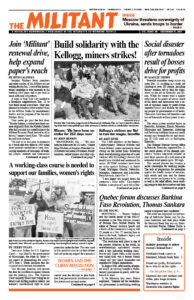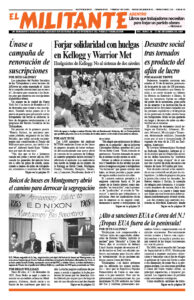Powerful tornadoes swept across six states Dec. 10, resulting in a death toll climbing to over 100 people, including factory workers left to fend for themselves on the job in Kentucky and Illinois. While the storms were a mighty reflection of the power of nature, much of the death and destruction was a result of decisions made by profit-driven capitalist bosses and disdain for working people by governments at all levels. Thousands have been left homeless and tens of thousands without power in winter.
The storm system wreaked havoc in Kentucky, Arkansas, Illinois, Missouri, Mississippi and Tennessee, shattering and flattening buildings large and small, tossing cars through the air and derailing 28 CSX train cars in Earlington, Kentucky.
The National Weather Service office in Paducah, Kentucky, reported Dec. 11 that aerial photos of the damage indicated a “historic long-track tornado” at least three-quarters of a mile wide with estimated wind speeds up to 200 mph.
This natural disaster has become a social catastrophe for working people. The lack of preparation for protection against the deadly ravage of tornados, high winds and rain and for shelter when storms are known to be coming, as well as for relief efforts, leave working people to fend for ourselves and then grapple with a disdainful government bureaucracy to get any help.
The two most deadly events took place in Mayfield, Kentucky, where a twister leveled the Mayfield Consumer Products candle factory where some 100 people were working, and in Edwardsville, Illinois, where a storm ripped the steel roof off of much of an Amazon warehouse, leaving dozens of workers in a death trap. In both plants bosses knew significant storms were predicted and that they had no protected tornado sanctuary on site, but decided not to send workers home for their safety.
“If you leave, you’re more than likely to be fired,” McKayla Emery, a worker at the candle factory, heard bosses say to workers there, reported NBC News. The factory had been operating round-the-clock producing candles for the Christmas season.
“It was extremely scary,” worker Kyanna Parson-Perez told Weekend TODAY news. “Everything happened so fast. They had us in the area where you go in case there’s a storm, and we were all there. Then, the lights got to flickering, and then all of a sudden we felt a gust of — we could feel the wind. Then, my ears kind of started popping, you know, as they would as if you’re on a plane.
“And then you did like a little rock, like, this way and this way. And then, boom, everything came down on us. All you heard was screams,” she said. She called 911 and then started livestreaming on Facebook. “I went live because I was trying to stay calm, and keep everybody else calm and try to give us as much help as possible.”
The company is one of the biggest employers in the area, one of the poorest in the state. Bosses pay workers $8 an hour, for both straight- and overtime, which makes it hard to hire enough labor. The bosses just made an arrangement to hire prisoners from two area jails.
They cut corners to maximize profits, and were fined by Occupational Safety and Health Administration in 2019 for violations involving electrical protective equipment, maintenance, safeguards, personal protective equipment and inadequate exit routes.
These prisoners joined other workers who rushed to the site to play a key role in rescuing workers they could hear crying out from under the rubble of the collapsed factory. “I tell you, some of those prisoners were working their tails off to get us out,” Parson-Perez said. “You know they could have used that moment to try to run away or anything. They did not. They were there, they were helping us. We were able to get the debris under us to move around and we were able to get out.”
“It’s hard to believe the factories were open,” Ryan Mitchcum, who runs a landscaping business in Mayfield, told the Washington Post. “It’s just a big metal building. They knew these storms were a threat.”
Workers pour out to help
Working people in the region have stepped forward to volunteer for the rescue and cleanup effort and are contributing clothes, food and water for the displaced. Small businesses and churches are providing meals and shelter.
Another deadly tornado made a direct hit on a nursing home with 67 residents in Monette, Arkansas. Workers and residents received no notice it was coming. Nurses on duty grabbed onto residents in their wheelchairs and lay across them, shielding them from flying debris as the building’s roof collapsed and the fire-prevention system began spraying water everywhere. “It felt like being on the Titanic while it was sinking,” one volunteer working to find survivors told the Washington Post.
Other nurses who were off their shift showed up to help, along with workers from the area. They rescued residents and set them up in their wheelchairs around running cars to keep them warm. One man who volunteers pulled from the wreckage didn’t make it.
Another tornado hit a 1.1-million-square-foot Amazon warehouse in Edwardsville, Illinois, one of three the company operates just outside St. Louis, at the 8:30 p.m. shift change, killing a yet-unknown number of workers. Thirty are known to have escaped on their own. Much of the roof and concrete walls were demolished. There was no tornado sanctuary on site. Workers were told to gather in a hallway and then sent to the bathrooms. “They made us shelter in place till we left. It was at least 2 1/2 hours in there,” Amazon worker David Kosiak told Reuters.
Billionaire Amazon founder Jeff Bezos — one of the world’s richest capitalist bosses — evoked widespread contempt when he posted a photo on social media the morning after the disaster of him welcoming the latest tourist passengers on his New Shepard rocket, which had just landed from a short trip to the edge of space. He greeted the small crew and the space sightseers, but failed to say anything to the media about the disaster in Illinois or the dead workers.
Workers at a number of Amazon facilities around the country have been trying to organize a union to fight against the brutal conditions, schedules and low wages at Amazon. Bezos has fought every one.
“Time and time again Amazon puts its bottom line above the lives of its employees,” Stuart Appelbaum, president of the Retail, Wholesale and Department Store Union, which is trying to organize workers at Amazon, said after the disaster in a Dec. 11 statement. “This is another outrageous example of the company putting profits over the health and safety of their workers, and we cannot stand for this.”
President Joseph Biden declared only one state, Kentucky, a disaster area, offering federal aid to those who can manage to navigate the paperwork and red tape. In Kentucky alone more than 50,000 were without power Dec. 12.

